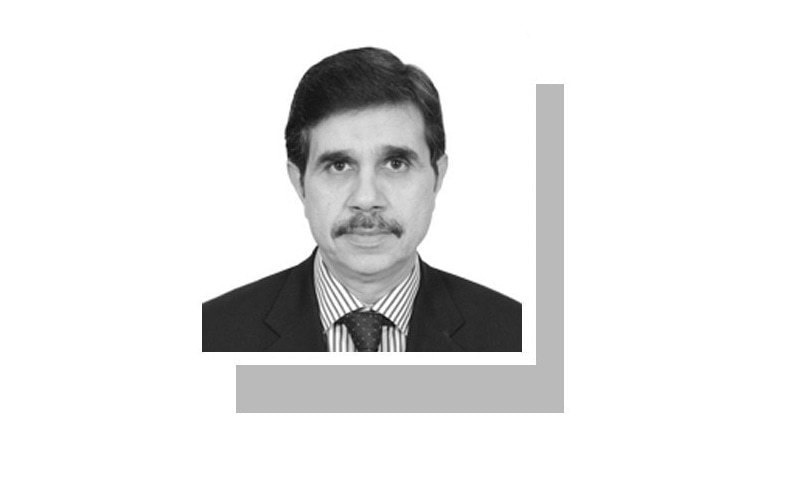THE underlying logic behind statements like ‘NAB and the economy cannot go together’ is that corruption greases the wheels. So, minus corruption, the economy’s wheels can come to a grinding halt. True. So far, in Pakistan, corruption has provided the required grease; for moving files that should have moved on their own, as well as files that should not have moved at all.
But if corruption is the only thing moving Pakistan’s economy, what of most countries in Europe and North America, even Singapore, where by all accounts corruption levels are quite low or at least much lower than Pakistan?
It is the rule of law, fear of the state, good governance, morality and honesty that oil the economy in these countries. So should we continue to rely on corruption or shift towards upholding these principles? To decide, let us look at the costs of corruption, and whether they outweigh the so-called benefit of oiling the economy.
Can Pakistan’s economy survive without graft?
Good governance is the key to performance in any field, and thus also the key to national well-being. It calls for abiding by the law, policies and rules — whether for awarding a contract to construct a dam or making people queue to pay a utility bill. Corruption involves favouring an individual or entity by violating laws, rules, etc. Hence, good governance and corruption cannot coexist.
The greater the avenues of corruption, the greater the urge and competition to hold such public offices that can facilitate it — it is no wonder that customs and police are the most-sought-after departments in the civil service. Huge amounts of money are spent to secure these coveted posts. Such office holders then engage in corruption to recover this money and make a profit. But this practice kills merit and lands the incompetent in office. Decisions become hostage to the ‘take’ involved rather than being determined by viability and national interest. Such is the cost of corruption.
Fiscal deficit, inflation and exchange rate are interlinked. Low revenues and high expenditures cause fiscal deficit. Revenue is low because the corrupt tax machinery lets evaders go. Public expenditure is high because the cost of building infrastructure and procuring goods in a corrupt environment is higher than it should be. The deficit is covered by printing more money, which causes inflation. Thus inflation is caused, at least partly, owing to corruption.
Higher expenditure means more imports. With exports and remittances not yielding enough dollars, we must borrow to pay for imports. Foreign borrowing, especially from the IMF, comes with strings attached — which at times involve compromising national sovereignty. Thus these strings are also caused, in part, by corruption.
Then there are burdensome indirect taxes, a major chunk of our national tax revenue. The government is forced to rely on regressive taxes because, thanks to corruption, the taxman knowingly looks the other way when a billionaire does not pay income tax.
Money is laundered abroad in foreign currency, which increases the demand for foreign currency and causes the rupee to depreciate. The depreciation makes imports, like fuel, expensive. This causes inflation. Typically, only black money is laundered, and laundering is not possible without corrupt officials. Money laundering and consequently corruption thus contributes to depreciation and inflation.
Corruption also leads to poor public infrastructure. One study shows that earthquakes are relatively more devastating in countries with high levels of corruption because it leads to unsafe buildings constructed in violation of building codes.
In a corrupt environment, businesses devote dedicated persons to cultivate ties with the quarters that matter. Man-hours better invested in productive activities are thus spent making files move.
Finally, corruption spreads like an epidemic. It is impossible to confine corruption to areas, if any, of relative benefit.
A sincere and concerted drive to check corruption will certainly slow down the economy in the short run. Unsafe buildings will not be constructed. Low-quality vaccines and stents will not be procured. Unhygienic water will not be bottled. Power plants that seek to produce electricity beyond the going market rate and pollute the environment will not be allowed to. All this means loss of jobs. So a short-term slowdown is inevitable, but it also means saving lives and building human capital that will go on to contribute to the economy and society in the long run. Closing the avenues of corruption will also put an end to money-based competition for coveted bureaucratic posts. Lesser money will be spent on seeking public office, making it possible for the poor to enter politics.
Corruption is, without a doubt, Pakistan’s No.1 problem. It must be tackled first and foremost with across-the-board accountability.
The writer is dean, Air University School of Management, and is associated with the Pakistan Institute of Development Economics, Islamabad.
Published in Dawn, July 24th, 2019











































